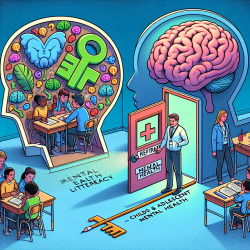Introduction
In the evolving landscape of global health, the influence of political and economic alliances such as the BRICS, G7, and G20 cannot be understated. These groups play a pivotal role in shaping global health priorities, which in turn impact national health agendas and practices, including those in speech-language pathology (SLP). The research article "Soft power and global health: the sustainable development goals (SDGs) era health agendas of the G7, G20 and BRICS" provides valuable insights into these dynamics.
Understanding the Global Health Agendas
The study analyzed health ministerial communiqués from these political clubs post-2015, the year the SDGs were adopted. The analysis highlighted overlaps in priorities such as emergency preparedness and universal health coverage, while also pointing out neglected areas like mental health and maternal and child health. For practitioners in the field of SLP, understanding these global priorities can inform and enhance practice, particularly in areas like child health and mental health.
Key Takeaways for Speech-Language Pathologists
- Focus on Neglected Areas: The study suggests expanding focus to neglected SDG 3 health targets, which include mental health and child health. SLPs can align their practice with these global priorities by advocating for and implementing comprehensive child health programs.
- Emphasize Equity: The commitment to equity and leaving no one behind is crucial. SLPs should ensure their services are accessible to all children, regardless of socio-economic status, to promote health equity.
- Adopt Rights-Based Approaches: Emphasizing human rights, including the right to health, can enhance the quality of care provided. SLPs should incorporate these principles into their practice to ensure inclusive and equitable services.
- Integrate Inter-Sectoral Collaboration: The research underscores the importance of collaboration with non-state actors. SLPs can benefit from partnerships with other healthcare providers, educators, and community organizations to create holistic care models.
Encouraging Further Research
The research highlights the importance of data-driven decisions in global health diplomacy. For SLP practitioners, this underscores the need for ongoing research and adaptation of practices based on emerging global health data. Engaging with current research can help practitioners stay informed and responsive to global health trends, ultimately leading to improved outcomes for children.
Conclusion
The insights from the study of global health agendas provide a framework for enhancing speech-language pathology practices. By aligning with global health priorities, SLPs can contribute to broader health goals while improving outcomes for their clients. To delve deeper into the research and its implications, I encourage practitioners to explore the original research paper: Soft power and global health: the sustainable development goals (SDGs) era health agendas of the G7, G20 and BRICS.










